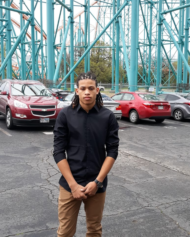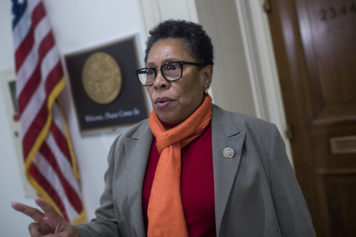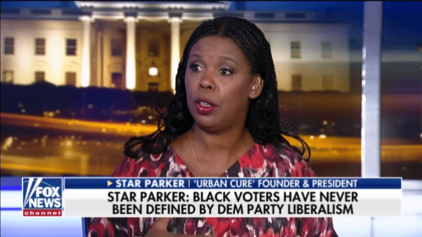The uproar over the new Army regulations banning many natural hairstyles commonly worn by Black women has reached the halls of Congress, as the women of the Congressional Black Caucus have sent a letter asking Defense Secretary Chuck Hagel to reconsider the updated rules.
The regulations, known as AR 670-1, dictate that Black women may wear their hair natural in twists or braids only if they are very narrow— no more than a quarter-inch in diameter. The Army has forbidden twists and dreadlocks since 2005, but the new regs for the first time stipulate the size of the twists—while still prohibiting dreads.
“Though we understand the intent of the updated regulation is to ensure uniformity in our military, it is seen as discriminatory rules targeting soldiers who are women of color with little regard to what is needed to maintain their natural hair,” said the letter from Rep. Marcia Fudge, D-Ohio, head of the Congressional Black Caucus. “African-American women have often been required to meet unreasonable norms as it relates to acceptable standards of grooming in the workplace.”
“Army officials have responded to criticism of the regulation by saying it applies to all soldiers regardless of race, and that they are meant to protect their safety,” the letter continues. “However the use of words like ‘unkempt’ and ‘matted’ when referring to traditional hairstyles worn by women of color are offensive and biased. The assumption that individuals wearing these hairstyles cannot maintain them in a way that meets the professionalism of Army standards indicates a lack of cultural sensitivity conducive to creating a tolerant environment for minorities.”
The letter concludes by asking Hagel to “reconsider the updated regulation.”
“Many African-American women put forth great effort in ensuring their hair is maintained in a way that allows them to be acknowledged for their ability and commitment to the tasks and challenges before them, rather than their appearance,” the letter says. “We urge you to consider the direction in which the updated regulation will ultimately lead the Armed Forces.”
The regulations also include prohibitions on tattoos (they’re still allowed, but only certain kinds in certain places in certain sizes), mustaches (short and trim, no Ron Burgundy-style bushy mustaches allowed), sideburns and mohawks are a no-go. But it is the hair rules that have drawn the most attack because there is so clearly a racial component to them—particularly at a time when more and more African-American women are choosing to wear their hair natural, without being straightened by chemicals or heat.
The Army now stipulates that hair “must be of uniform dimension, small in diameter (approximately ¼ inch), show no more than 1/8 (inch) of the scalp between the braids.” Dreadlocks “against the scalp or free-hanging” are banned. “Unkempt” or “matted” braids and cornrows are also considered dreadlocks and “are not authorized,” according to the regulations that were updated this month.
Sgt. Jasmine Jacobs of the Georgia National Guard started a White House petition asking the Obama administration to reconsider the policy because, “These new changes are racially biased and the lack of regard for ethnic hair is apparent.”
“More than 30% of females serving in the military are of a race other than white,” her petition at the White House “We the People” website states. “As of 2011, 36% of females in the U.S. stated that they are natural, or refrain from chemically processing their hair. Females with natural hair take strides to style their natural hair in a professional manner when necessary; however, changes to AR 670-1 offer little to no options for females with natural hair.”
It currently has drawn more than 16,000 signatures.
“We feel let down,” Jacobs told the Army Times. “I think, at the end of the day, a lot of people don’t understand the complexities of natural hair. A lot of people, instead of educating themselves, they think dreadlocks and they think Bob Marley, or they see women with really big Afros and they think that’s the only thing we can do with our hair.”
“In a broad sense, it’s just another example of U.S. institutions policing Black style,” Mark Anthony Neal, an African-American studies professor at Duke University, told CNN. “And it’s not that there aren’t other examples of such policing among other racial and ethnic groups. But, given the fraught relationship between Black identity and culture and what some Americans might perceive as ‘normal,’ it strikes a particularly dissonant chord among some Blacks.”
But the Army has responded by pointing out that Black women had a major role in crafting the new regulations.
“African-American female soldiers were involved in the process of developing the new female hair standards,” Lt. Col. Alayne P. Conway, spokeswoman for Army Headquarters at the Pentagon, said in a statement. “Not only were nearly 200 senior female leaders and soldiers (which included a representative sample of the Army’s populations) part of the decision-making process on the female hair standards, but the group was also led by an African-American female.”
“Many hairstyles are acceptable, as long as they are neat and conservative,” Conway said in an emailed statement to NPR. And, she added, safe: “Headgear is expected to fit snugly and comfortably, without bulging or distortion from the intended shape of the headgear and without excessive gaps.”
“Loading rounds into artillery tubes,” Conway said, “you don’t want hair getting into the way, obscuring your vision.”
But retired Lt. Col. Patricia Jackson-Kelley, a member of the National Association of Black Military Women, told the Washington Post she wasn’t buying that.
“I don’t see how a woman wearing three braids in her hair, how that affects her ability to perform her duty in the military,” she said.
The Army pointed out that if soldiers aren’t happy, they can go through a formal process to request changes to the hairstyle regulations.
“We encourage soldiers to make use of this process by sending recommendations and examples of hairstyles which could present professional appearances and conform to the regulation,” said Army spokesman Troy Rolan.
This pressure is “both unfair and racially biased,” Imani Perry, an African-American studies professor at Princeton University, told CNN.
“While it is reasonable for the military to expect some degree of conformity and neatness in hairstyles, those expectations ought to take into account the variety of natural hair textures people have,” Perry said. “For many African-American women who have tightly curled, coily or kinky hair, cornrows, braids and locs are styles that allow for ease of close-to-the-head grooming. Hence, banning those hairstyles puts Black female soldiers in a difficult bind with respect to the requirement.”
“Likewise, consideration ought to be made for different textures of hair,” Perry said. “Otherwise, a burden is placed disproportionately upon some soldiers due to an immutable characteristic, natural hair texture that is tied to race.”
But as NPR indicated, on social media sites there are many Black veterans of both genders voicing agreement with the new regs.
“It’s the Army. And you volunteered for it,” one commenter said. “Armies usually demand a uniform appearance. This is what ‘uniform’ means. Get over it.”
And then there were comments like this one: “You People are always asking for special treatment. This is just the latest example.”


